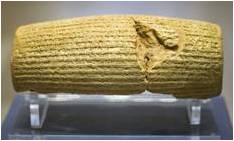3rd March 2015
Human Rights and the Cyrus Cylinder
Next week the Foreign Office will release its annual report on Human Rights and Democracy. It will showcase some of the work the UK has been doing to promote human rights around the world over the course of our current parliament (ie. the last five years), paying special attention to the value we place on civil society. It will also look in detail at 27 “countries of concern”, in which we consider there to be the most serious violations and abuses of human rights, and 10 “case study countries”, where the focus is on one particular ‘theme’.
Human Rights are sometimes portrayed as a “Western” concept or invention (usually most vociferously by those committing the most serious violations). This is, in fact, a misreading of centuries of history which led up to the adoption of the Universal Declaration of Human Rights in 1948. Way back in 539 B.C., the armies of Cyrus the Great, the first king of ancient Persia (modern day Iran), conquered the city of Babylon. In doing so, and as he prepared to govern his new territory, he declared that slaves would be free, people had the right to choose their own religion, and that different races living in the city would be treated equally. He recorded all of this on a baked-clay cylinder (known today as the Cyrus Cylinder and resident in the British Museum) – an ancient record that has been recognised by many as the world’s first charter of human rights. It is translated into all six official languages of the United Nations and its provisions mirror the first four Articles of the Universal Declaration.
Cyrus’ ideas, which played an important role in developing the concept that human rights are not limited to one cultural tradition, would be built upon by other great civilisations in the coming centuries. The Edicts of Ashoka, 33 inscriptions recording laws set down by the Emperor Ashoka of the Mauryan Empire between 273 and 232 BC, can be found across modern-day Bangladesh, Nepal, India and Pakistan. He is credited with promoting tolerance and understanding between religious communities, humanitarian ideals in warfare and the right to a fair trial. Some centuries later, the Prophet Muhammad would draft the Charter of Medina (c.622), which some academics have argued was the first constitution to enshrine a set of basic human rights.
Western countries would play an important role too, but later: the Magna Carta (1215) in England (we will shortly be celebrating its 800th anniversary), the US Constitution (1787) and the French Declaration of the Rights of Man (1789) are all widely acknowledged to have played an important role in shaping the Universal Declaration. That declaration would, for the first time, enshrine a set of basic rights which the governments of UN Member States were expected to ensure were granted to all their citizens. International bodies, treaties and organisations were tasked with upholding these, and individual countries were able to hold each other account; for the first time against a set of commonly agreed principles.
The report is one way in which the UK seeks to do this. Disappointingly, Ethiopia will once again this year again feature as a “country case study” – together with five other African countries: Egypt, Nigeria, The Gambia, Burundi and Rwanda. This is because Ethiopia’s impressive record on economic growth and development in recent years has not been matched by progress on civil and political rights. We continue to be concerned by the overly broad use of the Anti-Terrorism Proclamation; a lack of political space in the run up to the election; the behaviour, in some instances, of the security forces, and restrictions on media freedom – which this year’s report will look at in more detail. This assessment is shared by the African Good Governance Index, which uses African and global indexes to rank countries across a range of economic, social, civil and political rights. Ethiopia’s strong gains on issues such as gender and health rights are in stark contrast to its position, languishing at the bottom of continental league tables, on political participation and freedom of assembly and expression.
Most importantly though, these issues matter to more and more Ethiopians. It would be wonderful if next year we could see Ethiopia not included in the list of countries covered in our human rights report. More competitive elections than in 2010, narrower use of the ATP and better accountability for security forces would go a long way towards this. It would mean the country would have another good story to tell, as it already does on development and the role it plays on the regional and international stage.
